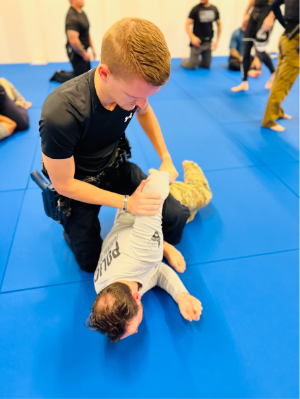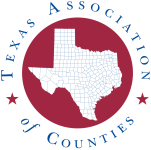County Magazine | July 23, 2024
Guadalupe County looks to martial arts to improve policing
Brazilian jiu jitsu aims to de-escalate and preserve energy in an encounter

The Guadalupe County Sheriff’s Office recently introduced a Brazilian jiu jitsu program to help deputies and detention officers improve their physical fitness, as well as their de-escalation and defensive tactics.
The program is based on the self-defense martial arts system that focuses on leverage and distance management to defeat larger and more athletic opponents, among other principles, according to Gracie University, an organization that offers Gracie jiu jitsu training.
The Guadalupe County Sheriff’s Office learned about the program from the Seguin Police Department, said Guadalupe County Lt. Robert Locker. The police department trained some sheriff’s deputies, including Locker, in Gracie jiu jitsu instructor courses, which allowed them to train their fellow deputies in Guadalupe County. Guadalupe County has also trained members of the Schertz Police Department and Comal County Sheriff’s Office.
“These tactics and the training teach students to overcome the difficulties, both physically and mentally, that come from being placed in highly stressful situations,” Locker said. “The methods teach our personnel to overcome a physical altercation with as little force as possible, given the circumstances they face.”
Locker described the practice as a system that focuses on energy management, which involves using another person’s energy instead of his own to exhaust an opponent. Officers practice “getting heavy” by limiting their opponent’s ability to escape by using their body weight as leverage. The more an opponent is trying to lift an officer, the more tired they get. The officer simply moves and changes his center of gravity while the opponent continues to work hard to move him.
The system reinforces de-escalation, sound decision making, mission-specific tactics, injury reduction on both sides, and community trust building.
“If I get in a situation where somebody has me on the ground, if I can buy time to where they get tired and I'm not trying to expend all my energy, then that might give me a safe way out of that situation,” Locker said.
With a sheriff’s office that covers more square miles than a typical police department does, Locker said it makes even more sense for deputies to learn these de-escalation and self-defense techniques.

“Do I have to engage physically with somebody? Can I take the time to de-escalate? Can I create distance from them? If not, how can I let them use their energy instead of me?” Locker said.
The course was offered to Guadalupe County deputies and detention officers, as well as officers from surrounding agencies, allowing them to initiate or advance their programs. The Guadalupe County Sheriff’s Office sent four deputies and two detention officers to become certified instructors, enabling them to teach all law enforcement and detention personnel.
Locker said he has seen the techniques at work in the field. Deputies observed Seguin Police officers subdue a male subject who was suffering a mental health crisis in a local retail store. They were able to control with minimal force used against the subject, who had been physically fighting their officers.

